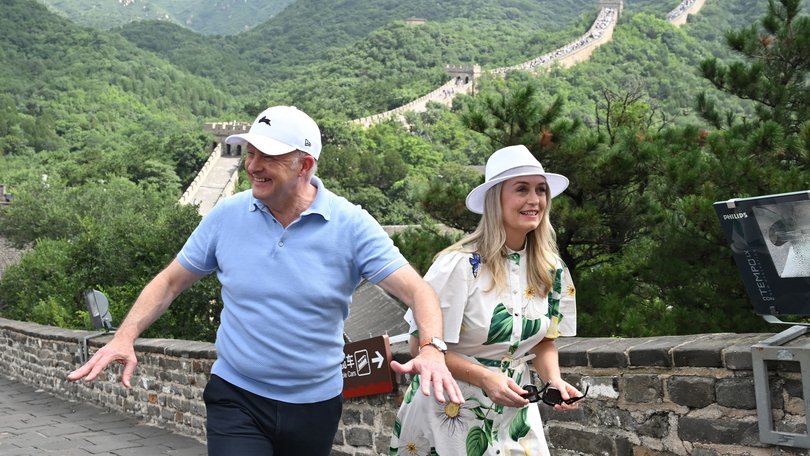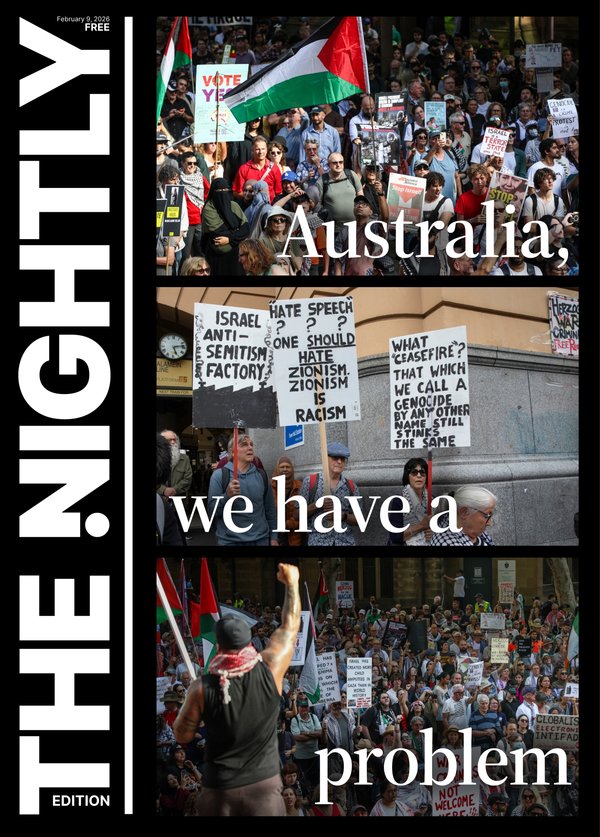Australian news and politics live: Albanese not budging on Port of Darwin despite calls to resolve issue
LIVE UPDATES: Prime Minister Anthony Albanese has been forced to address concerns raised in a state-based Chinese media outlet, as he assessed achievements from meetings with officials.

: Scroll down for the latest news and updates.
Key events
16 Jul 2025 - 01:24 PM
Big call made on childcare ‘man ban’
16 Jul 2025 - 01:22 PM
Figures make a mockery of Treasurer’s claim
16 Jul 2025 - 12:00 PM
Albanese’s Great Wall defence for Darwin Port stance
16 Jul 2025 - 11:57 AM
Failure to improve productivity costs average worker $500,000 over 25 years, says Henry
16 Jul 2025 - 11:23 AM
We warned about Budget pressure under Costello, says Henry
16 Jul 2025 - 11:20 AM
Ken Henry: It “boggles the mind” we don’t have a carbon tax
16 Jul 2025 - 10:41 AM
Albanese, Haydon take a stroll along the Great Wall of China
16 Jul 2025 - 10:31 AM
China treats Albo to Aussie classics at Great Hall event
16 Jul 2025 - 10:24 AM
Albo doubles down on Port of Darwin, despite not discussing with Li
16 Jul 2025 - 09:49 AM
Latham breaks silence on X-rated texts sent from parliament
16 Jul 2025 - 09:39 AM
Albanese reiterates Taiwan position, supports one-China policy
16 Jul 2025 - 09:36 AM
Albanese assessment of China trip so far
16 Jul 2025 - 09:32 AM
Albanese says Australia will still deal with China issues on ‘case-by-case’ basis
16 Jul 2025 - 09:27 AM
Albanese reflects on history of Australia-China relationship
16 Jul 2025 - 09:26 AM
Chinese delegation to visit Australia, PM says
16 Jul 2025 - 09:21 AM
Albanese says China meetings ‘symptomatic’ of the important Australia-China relationship
16 Jul 2025 - 09:17 AM
Albanese speaking from Great Wall of China.
16 Jul 2025 - 08:34 AM
Husic flags concerns with Segal’s antisemitism report
16 Jul 2025 - 07:16 AM
Trump warns Pharma tariffs by the end of the month
16 Jul 2025 - 06:53 AM
Butler: Murdoch’s death a chance to mourn Falconio again
16 Jul 2025 - 06:46 AM
Clare: Childcare system failed families in STI scandal
16 Jul 2025 - 06:20 AM
LATIKA BOURKE: Elbridge Colby is trying to use Trump’s MAGA tough talk strategy to push Australia
16 Jul 2025 - 06:16 AM
PM to visit Great Wall as Australia and China sign trade deals
+2
Max Corstorphan and 2+ more are reporting live.
Albo doubles down on Port of Darwin, despite not discussing with Li
Prime Minister Anthony Albanese was asked to respond to comments in the Global Times saying the Port of Darwin sale needed to be dealt with, and if he was ready for Australia to be “put back into the deep freeze”.
“The answer is no,” Mr Albanese said.
“That shouldn’t come as any surprise.
“I’ve had the same position as when I was the shadow Infrastructure minister, when the decision was made to provide a Federal incentive by the Liberal Party to flog off the Port of Darwin.
“My position hasn’t changed over a long period of time.”
Latham breaks silence on X-rated texts sent from parliament
Explosive new allegations about the behaviour of MP Mark Latham have emerged after a call log showing he had sent sexually explicit text messages while in the parliamentary chamber was made public.
The graphic WhatsApp messages were allegedly sent to his then-partner Nathalie Matthews.
The pair ended their long-term relationship on May 27 and Ms Matthews has accused the former Labor leader of physical and financial abuse as part of an application for a domestic violence order.
Allegations he has denied and labelled “comically false and ridiculous”.
Mr Latham won a seat in the NSW upper house as a One Nation representative in 2019. He was re-elected in 2023, then quit the far-right party to become an independent after falling out with party founder Pauline Hanson.
Albanese reiterates Taiwan position, supports one-China policy
Mr Albanese was asked about the wording he used when speaking about Taiwan during his official meetings with Chinese leaders.
“What we do is continue to support a one-China policy,” Mr Albanese said.
“We support the status quo.
“By definition, we don’t support any unilateral action on Taiwan.
“That’s been our position for a long period of time. Nothing’s different there.”
Albanese assessment of China trip so far
Prime Minister Anthony Albanese gave an assessment of his official trip to China so far, giving multiple suburbs in Australia, all starting with the letter B, a shoutout.
“Well, it’s been really constructive and for the people of Bankstown, or the people of Box Hill or the people of Bassendean, what we need is to engage in our national interest and to always be focused on cost of living, be focused on jobs, be focused on the living standards of Australians, and that depends upon our trade but also depends upon our good relationship and being able to support a peace and security and stability in our region and we have had yesterday,” Mr Albanese said.
“I had meetings for around about eight hours yesterday.
“It was a very long meeting, but it also showed respect (from) both sides.
“The fact that President Xi didn’t just have a meeting, but we had a lunch where President Xi as well invited Jodie to attend that lunch, it was a sign of respect to Australia, to our country.”
Albanese says Australia will still deal with China issues on ‘case-by-case’ basis
Mr Albanese was asked about Premier Li’s comments around AI, seeking deeper Australian-Chinese cooperation.
“We’ll deal with issues on a case-by-case basis based upon our national interest as it’s perceived at the time,” Mr Albanese said.
“But as a general principle, of course, one of the things that I emphasise - I say the same thing in Beijing as I say in Bankstown - which is that the Australian Government supports free and fair trade.
“It’s in the interests of the world to have free and fair trade and we’ll continue to engage that way.
“We support our national interest. That’s my job. And my job is to support Australian jobs and that is what we do, consistently, across the board, and support Australia’s national interests.”
Albanese reflects on history of Australia-China relationship
Mr Albanese said he felt a “sense of history” standing on the Great Wall of China as the Prime Minister of Australia.
“Here today, of course, I had the sense of history, following in the footsteps of the Labor Prime Minister Gough Whitlam, who was the first Prime Minister to visit here in 1973,” Mr Albanese said.
“It followed the correct decision that he made as Leader of the Labor Party in 1971, and that was, of course, at the time, when that was a controversial decision, to recognise the People’s Republic of China.
“Of course, at that time in the world, the United States, led by Richard Nixon and Henry Kissinger of course, also engaged historically.
“It’s important that here, we build stability and security in our world and part of that has to be positive engagement.
“That’s what I’m doing here and I’m very honoured to be here today.”
Chinese delegation to visit Australia, PM says
Mr Albanese said meetings on Tuesday saw “practical initiatives” discussed with Chinese businesses and that a delegation will soon visit Australia.
“Yesterday’s round-table came up with some practical initiatives going forward, including further work on steel, decarbonisation between Australian businesses and Chinese businesses,” the Prime Minister said.
“I spent more than two hours with President Xi and an equally long time with Premier Li as well as having a constructive meeting with Chairman Zhou of the National People’s Congress, who has agreed to lead a delegation to Australia to reciprocate the delegation that came from Australia to China.
“So we look forward to welcoming that delegation in Australia.
“Yesterday was an opportunity as well for us to develop the relationship between Australia and China.”
Albanese says China meetings ‘symptomatic’ of the important Australia-China relationship
Mr Albanese says China’s achievement has also seen a rise that has benefited the Asia-Pacific region’s economy.
“Over the past few days, I’ve had important meetings as well with the business community,” the Prime Minister said from the Great Wall.
“The fact that we had yesterday at the business round-table representatives of financial institutions such as ANZ, education institutions such as Monash and the University of New South Wales, as well as the great resources companies - BHP, Rio Tinto, Fortescue and others - is symptomatic of the importance for the Australian economy that a good relationship with China means.
“That is a relationship that is built upon the fact that one in four of Australian jobs is trade-dependent and our largest trading partner, by a long distance, is China.”
Albanese speaking from Great Wall of China.
Prime Minister Anthony Albanese is speaking from the Badaling section of the Great Wall of China.
“This is one of the wonders of the world, some 21,000km long,” Mr Albanese said.
“This particular section was built in 1505. We are literally standing on history. History in recognition of the longevity of Chinese culture and Chinese achievement as well. It’s my great honour to be here for the first time as Prime Minister.
“I came here as part of a parliamentary delegation in the end of the 1990s, a bipartisan delegation, and I... when I became a member of Parliament in 1996, I wanted to make sure that I understood the rise of China.
“It was very clear that China was going to be a very powerful country over the years to come and the economic achievement that we have seen China achieve over recent decades has seen literally hundreds of millions of people lifted out of poverty.”
Husic flags concerns with Segal’s antisemitism report
Labor backbencher Ed Husic has urged the government to take a measured approach in its efforts to combat antisemitism, warning against a “heavy handed” response.
Special Envoy Jillian Segal delivered her plan to combat antisemitism last week, which included a recommendation to potentially withhold funding from universities that fail to take meaningful action against antisemitism.
“I would much prefer us finding ways to bring people together rather than being heavy-handed in response,” Mr Husic told ABC RN on Wednesday morning.
He also raised concerns with Ms Segal’s suggestion that young people are at risk of becoming “fully fledged antisemites due to misinformation”.
“I think (it) runs the risk of being a bit too sweeping.
“I think younger Australians, like most Australians, are genuinely moved by what they’re seeing in the Middle East, and it shouldn’t necessarily be assumed, or a conclusion drawn, that that’ll lead to antisemitism.”

